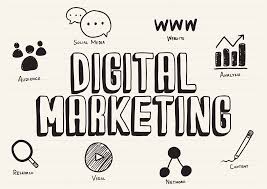Digital marketing and online marketing are terms often used interchangeably, but they have subtle differences in their scope and approach. While both strategies leverage digital channels, it is important to understand the distinctions between the two. In this article, we will explore the relationship between digital marketing and online marketing and highlight their differences.

- Definition of Digital Marketing:
Digital marketing refers to the broader concept of utilizing digital technologies and channels, such as the internet, social media, mobile devices, search engines, and email, to promote products or services. It encompasses various components, including online marketing, as well as offline digital channels like mobile apps, digital displays, and electronic billboards. - Definition of Online Marketing:
Online marketing, also known as internet marketing or web marketing, focuses specifically on marketing efforts conducted through online channels. It encompasses strategies such as search engine optimization (SEO), social media marketing, email marketing, pay-per-click (PPC) advertising, and website optimization. Online marketing primarily involves marketing activities that take place on the internet. - Differences between Digital Marketing and Online Marketing:
While digital marketing is a broader concept, online marketing is a subset of digital marketing. The key differences between the two are as follows:
a. Channel Scope: Digital marketing encompasses both online and offline digital channels, such as mobile apps, digital displays, and electronic billboards. Online marketing, on the other hand, specifically refers to marketing activities conducted through internet-based channels.
b. Offline Components: Digital marketing includes offline components, such as digital signage and mobile apps, which are not considered online marketing. These offline components provide additional avenues for businesses to engage with their audience beyond the traditional online channels.
c. Strategy Focus: Digital marketing focuses on leveraging digital technologies and channels to achieve marketing goals, both online and offline. Online marketing, in contrast, places primary emphasis on online channels and strategies.
d. Online Marketing Tactics: Online marketing tactics are a subset of digital marketing tactics. Online marketing primarily includes strategies like SEO, social media marketing, email marketing, PPC advertising, and website optimization, which specifically target online platforms.
- Integration and Synergy:
While digital marketing and online marketing have their distinctions, they often work together synergistically. Online marketing tactics are an integral part of digital marketing strategies, as online channels play a significant role in reaching and engaging audiences. By integrating online marketing efforts with offline digital components, businesses can create comprehensive digital marketing campaigns that maximize their reach and impact.
Digital marketing is a broader concept that encompasses both online and offline digital channels, while online marketing focuses specifically on marketing activities conducted through online channels. While there are differences between the two, they are closely related and often work together in integrated marketing strategies. Understanding these distinctions helps businesses develop comprehensive digital marketing approaches that leverage online channels while incorporating offline digital components to engage their target audience effectively.









